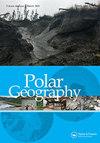导论:女权主义研究方法与北极社会科学中的性别研究
IF 2
Q3 GEOGRAPHY, PHYSICAL
引用次数: 25
摘要
尽管北极圈北部不同地区的接触逐渐加强,但北极地区的性别研究仍然是一个支离破碎的领域——不仅仅是因为语言障碍。这里介绍的四个案例都来自俄罗斯的远北地区,旨在补充北美和北欧国家的性别研究。我们也希望他们能鼓励在地理和社会科学中更广泛地使用女权主义方法。在第一次概述了性别如何成为北极圈北极的一个研究主题之后,引言将侧重于特定性别形式的流动性和不流动性。接下来,性别将讨论在殖民和后殖民条件下的身份和交叉性。此后,女性主义政治生态学等理论方向被描绘为研究性别经济的理论途径。北极性别研究的这种背景化为本期特刊的四篇论文的简短总结奠定了基础,并以对未来研究方向的简短陈述作为结束语。特别是交叉性的概念被认为是研究性别、土著和经济差异的有用基础。本文章由计算机程序翻译,如有差异,请以英文原文为准。
Introduction: feminist approaches and the study of gender in Arctic social sciences
ABSTRACT Notwithstanding the gradual intensification of contacts across the different parts of the circumpolar North, research on gender in the Arctic is still a fragmented field – not the least because of language barriers. The four cases presented here, all from the Far North of Russia, are intended to complement research on gender in North America and the Nordic countries. We also hope they will encourage wider use of feminist approaches in geography and social sciences. After a first overview of how gender emerged as a topic of study in the circumpolar North, the introduction will focus on gender-specific forms of mobility and immobility. Next, gender will be discussed in relation to identity and intersectionality under colonial and post-colonial conditions. Thereafter, Feminist Political Ecology and other theoretical directions are portrayed as theoretical approaches to studying gendered economies. Such contextualization of the study of gender in the Arctic prepares the ground for short summaries of the four papers in this special issue, to be concluded by a brief statement about future directions of research. Particularly the concept of intersectionality is favored as a useful basis for examining gender, indigeneity, and economic differences.
求助全文
通过发布文献求助,成功后即可免费获取论文全文。
去求助
来源期刊

Polar Geography
GEOGRAPHY, PHYSICAL-
CiteScore
5.30
自引率
0.00%
发文量
13
期刊介绍:
Polar Geographyis a quarterly publication that offers a venue for scholarly research on the physical and human aspects of the Polar Regions. The journal seeks to address the component interplay of the natural systems, the complex historical, political, economic, cultural, diplomatic, and security issues, and the interchange amongst them. As such, the journal welcomes comparative approaches, critical scholarship, and alternative and disparate perspectives from around the globe. The journal offers scientists a venue for publishing longer papers such as might result from distillation of a thesis, or review papers that place in global context results from coordinated national and international efforts currently underway in both Polar Regions.
 求助内容:
求助内容: 应助结果提醒方式:
应助结果提醒方式:


